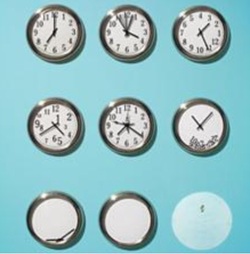
I always thought it was Steven Wright who said, “Time keeps everything from happening all at once.” Turns out it was French philosopher Henri Bergson – at least according to Physics Hypertextbook at http://physics.info/ (and if it’s on the Internet, it must be true – just like all of the information herein at http://thedickinson.net is true about Emmett Lee Dickinson, Emily Dickinson’s third cousin, twice removed – at her request).
Time is certainly a funny thing. Paradoxical really. For example, if time stretches infinitely into the future, and there is
no end, then doesn’t it also stretch infinitely into the past – and there was no beginning?
Emily Dickinson wrote…
Forever – is composed of Nows –
‘Tis not a different time –
Except for Infiniteness –
And Latitude of Home –
Of course, “Forever” is also composed of “Thens.”
That’s a quirky thing about time: at the very instant when “today” becomes “tomorrow,” “today” also becomes
“yesterday.” In truth, the very instant every “now” becomes the future, the very same “now”becomes the past.
Time is quite stable that way. And unstable?
In a letter to her cousin Louise Norcross, Emily Dickinson wrote, “for what is each instant but a gun, harmless because ‘unloaded,’ but that touched ‘goes off’?”
Talk about volatility! Every instant of “now” eliminates the present time to the past as it reveals (and consumes) the future.
Dickinson understood this fickle nature of time. In a letter to a friend in 1845, she wrote somewhat facetiously, “Have you altered any since I have seen you? Isn’t it a funny question for one friend to ask another? I haven’t altered any….” Instead, Dickinson would have agreed most certainly with Lewis Carroll who, in a line from Alice in Wonderland, said, “I can't go back to yesterday because I was a different person then.”
I can’t go back to yesterday, so today I just keep PLOGGIng along. PLOGging right along about “Time”: I have been posting my “Top Ten References to Time by Emily Dickinson.” In my most recent post (dated 06/30/2013), I included links to my numbers 10, through 7. Here are links to numbers 6 through 3 on my list:
Number 6: Click HERE.
Number 5: Click HERE.
Number 4: Click HERE.
Number 3: Click HERE.
Check back later for my Two 2 references to Time by Emily Dickinson -- I'll post them when I find the time.
Talk about paradoxes, Julian Barbour, a British physicist with research interests in quantum gravity and the history of science, stated, “We shall come to see that time does not exist.” George Musser concurred -- sort of? He wrote an article for “Scientific American” entitled, “The Paradox of Time: Why It Can’t Stop, but Must.” A preview of his article is HERE.
I’ll stop for now. Time’s up.
(Or is it down?)
 RSS Feed
RSS Feed
